For the 2025 school year, there is 1 public preschool serving 143 students in Staunton City School District.
Public Preschools in Staunton City School District have a diversity score of 0.60, which is less than the Virginia public preschool average of 0.72.
Minority enrollment is 41% of the student body (majority Black), which is less than the Virginia public preschool average of 56% (majority Hispanic and Black).
Overview
This School District
This State (VA)
# Schools
6 Schools
1,059 Schools
# Students
2,695 Students
522,218 Students
# Teachers
205 Teachers
37,218 Teachers
Student : Teacher Ratio
13:1
13:1
District Rank
Staunton City School District, which is ranked within the bottom 50% of all 135 school districts in Virginia (based off of combined math and reading proficiency testing data) for the 2020-2021 school year.
The school district's graduation rate of 88% has increased from 80-84% over five school years.
Overall District Rank
#70 out of 135 school districts
(Bottom 50%)
(Bottom 50%)
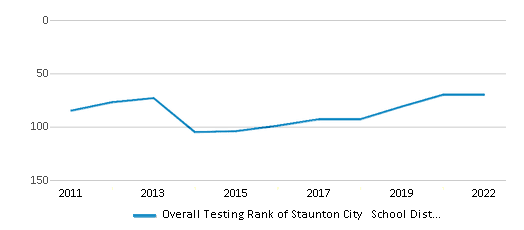
Math Test Scores (% Proficient)
(20-21)48%
54%
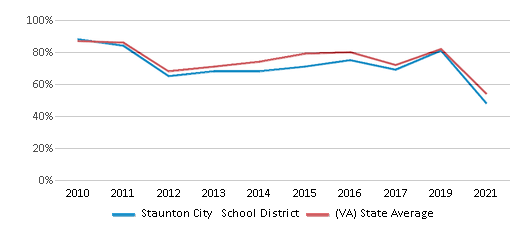
Reading/Language Arts Test Scores (% Proficient)
(20-21)67%
69%
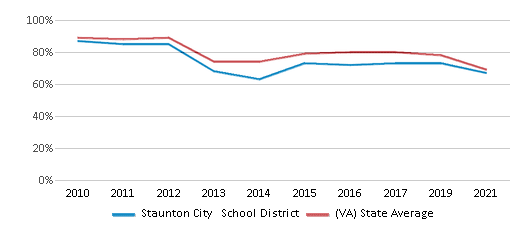
Science Test Scores (% Proficient)
(20-21)47%
59%
Graduation Rate
88%
89%
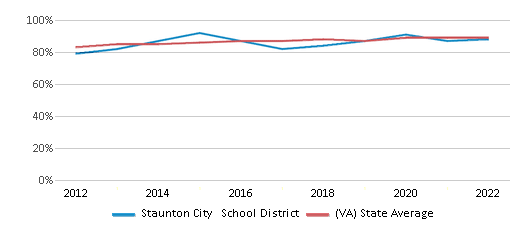
Students by Ethnicity:
Diversity Score
0.57
0.72
# American Indian Students
9 Students
1,435 Students
% American Indian Students
n/a
n/a
# Asian Students
42 Students
42,355 Students
% Asian Students
2%
8%
# Hispanic Students
242 Students
104,836 Students
% Hispanic Students
9%
20%
# Black Students
342 Students
103,630 Students
% Black Students
13%
20%
# White Students
1,683 Students
231,144 Students
% White Students
62%
44%
# Hawaiian Students
1 Student
693 Students
% Hawaiian Students
n/a
n/a
# Two or more races Students
376 Students
38,125 Students
% of Two or more races Students
14%
8%
Students by Grade:
# Students in PK Grade:
143
34,291
# Students in K Grade:
201
76,338
# Students in 1st Grade:
185
80,198
# Students in 2nd Grade:
215
82,775
# Students in 3rd Grade:
177
74,941
# Students in 4th Grade:
202
76,158
# Students in 5th Grade:
196
74,304
# Students in 6th Grade:
179
13,434
# Students in 7th Grade:
223
1,615
# Students in 8th Grade:
185
653
# Students in 9th Grade:
190
1,849
# Students in 10th Grade:
214
1,917
# Students in 11th Grade:
175
1,904
# Students in 12th Grade:
210
1,841
# Ungraded Students:
-
-
District Revenue and Spending
The revenue/student of $15,297 in this school district is less than the state median of $15,502. The school district revenue/student has stayed relatively flat over four school years.
The school district's spending/student of $19,587 is higher than the state median of $15,257. The school district spending/student has stayed relatively flat over four school years.
Total Revenue
$41 MM
$19,496 MM
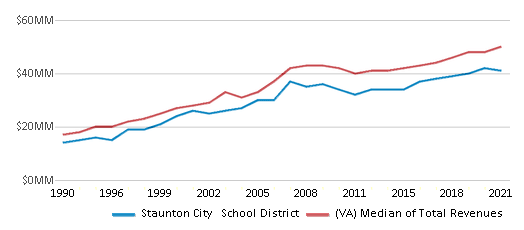
Spending
$53 MM
$19,187 MM
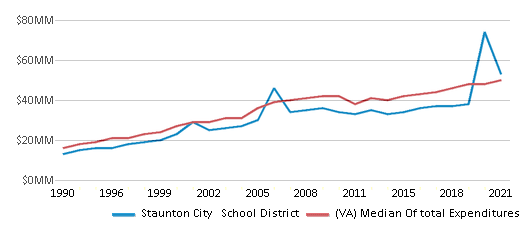
Revenue / Student
$15,297
$15,502
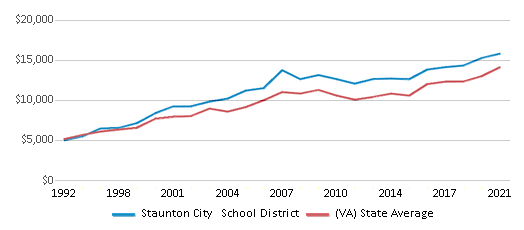
Spending / Student
$19,587
$15,257
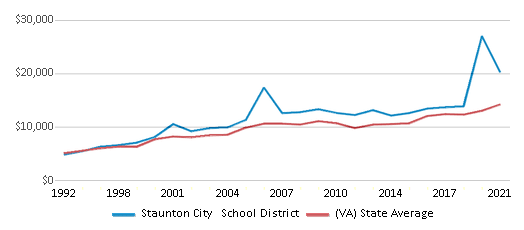
Best Staunton City School District Public Preschools (2025)
School
(Math and Reading Proficiency)
(Math and Reading Proficiency)
Location
Grades
Students
Rank: n/an/a
1751 Shutterlee Mill Road, Dix
Staunton, VA 24401
(540) 332-3934
Staunton, VA 24401
(540) 332-3934
Grades: PK
| 143 students
Recent Articles

Sexual Harassment at Age 6: The Tale of a First Grade Suspension
A six-year old in Aurora, Colorado, was suspended after singing an LMFAO song to a little girl in his class and reportedly “shaking his booty.” We look at the case and the sexual harassment problem in public schools today.

How Scaffolding Could Change the Way Your Child Learns
This article explores the concept of instructional scaffolding, a teaching method that enhances learning by breaking down complex tasks into manageable parts. It highlights how scaffolding supports students in developing critical thinking skills and becoming more independent learners. The article discusses the benefits of scaffolding, including improved engagement and reduced anxiety, and provides strategies for its implementation across various educational levels.

February 05, 2025
Understanding the U.S. Department of Education: Structure, Impact, and EvolutionWe explore how the Department of Education shapes American education, from its cabinet-level leadership to its impact on millions of students, written for general audiences seeking clarity on this vital institution.





